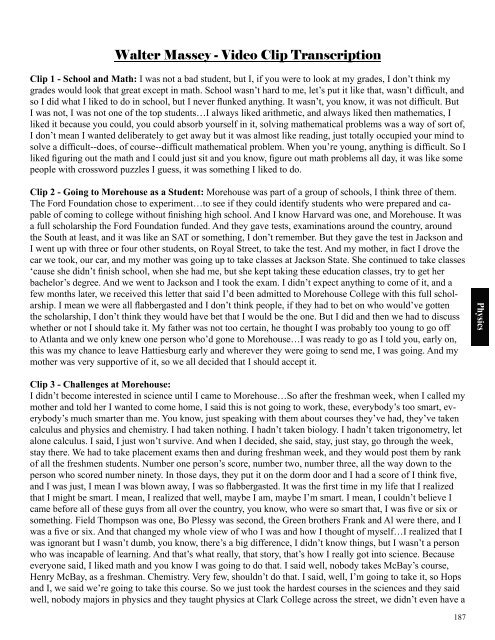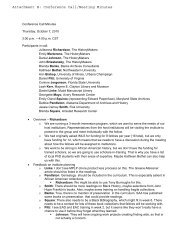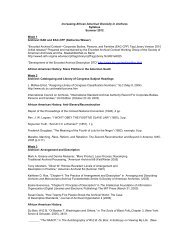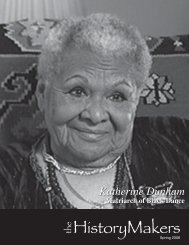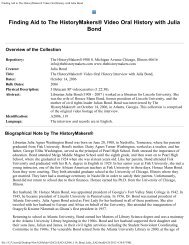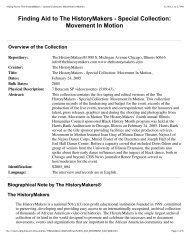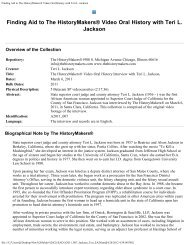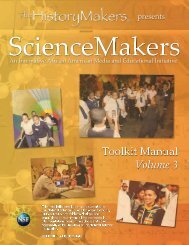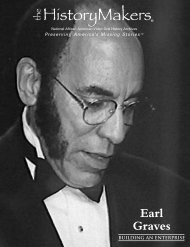ScienceMakers Toolkit Manual - The History Makers
ScienceMakers Toolkit Manual - The History Makers
ScienceMakers Toolkit Manual - The History Makers
Create successful ePaper yourself
Turn your PDF publications into a flip-book with our unique Google optimized e-Paper software.
Walter Massey - Video Clip Transcription<br />
Clip 1 - School and Math: I was not a bad student, but I, if you were to look at my grades, I don’t think my<br />
grades would look that great except in math. School wasn’t hard to me, let’s put it like that, wasn’t diffi cult, and<br />
so I did what I liked to do in school, but I never fl unked anything. It wasn’t, you know, it was not diffi cult. But<br />
I was not, I was not one of the top students…I always liked arithmetic, and always liked then mathematics, I<br />
liked it because you could, you could absorb yourself in it, solving mathematical problems was a way of sort of,<br />
I don’t mean I wanted deliberately to get away but it was almost like reading, just totally occupied your mind to<br />
solve a diffi cult--does, of course--diffi cult mathematical problem. When you’re young, anything is diffi cult. So I<br />
liked fi guring out the math and I could just sit and you know, fi gure out math problems all day, it was like some<br />
people with crossword puzzles I guess, it was something I liked to do.<br />
Clip 2 - Going to Morehouse as a Student: Morehouse was part of a group of schools, I think three of them.<br />
<strong>The</strong> Ford Foundation chose to experiment…to see if they could identify students who were prepared and capable<br />
of coming to college without fi nishing high school. And I know Harvard was one, and Morehouse. It was<br />
a full scholarship the Ford Foundation funded. And they gave tests, examinations around the country, around<br />
the South at least, and it was like an SAT or something, I don’t remember. But they gave the test in Jackson and<br />
I went up with three or four other students, on Royal Street, to take the test. And my mother, in fact I drove the<br />
car we took, our car, and my mother was going up to take classes at Jackson State. She continued to take classes<br />
‘cause she didn’t fi nish school, when she had me, but she kept taking these education classes, try to get her<br />
bachelor’s degree. And we went to Jackson and I took the exam. I didn’t expect anything to come of it, and a<br />
few months later, we received this letter that said I’d been admitted to Morehouse College with this full scholarship.<br />
I mean we were all fl abbergasted and I don’t think people, if they had to bet on who would’ve gotten<br />
the scholarship, I don’t think they would have bet that I would be the one. But I did and then we had to discuss<br />
whether or not I should take it. My father was not too certain, he thought I was probably too young to go off<br />
to Atlanta and we only knew one person who’d gone to Morehouse…I was ready to go as I told you, early on,<br />
this was my chance to leave Hattiesburg early and wherever they were going to send me, I was going. And my<br />
mother was very supportive of it, so we all decided that I should accept it.<br />
Clip 3 - Challenges at Morehouse:<br />
I didn’t become interested in science until I came to Morehouse…So after the freshman week, when I called my<br />
mother and told her I wanted to come home, I said this is not going to work, these, everybody’s too smart, everybody’s<br />
much smarter than me. You know, just speaking with them about courses they’ve had, they’ve taken<br />
calculus and physics and chemistry. I had taken nothing. I hadn’t taken biology. I hadn’t taken trigonometry, let<br />
alone calculus. I said, I just won’t survive. And when I decided, she said, stay, just stay, go through the week,<br />
stay there. We had to take placement exams then and during freshman week, and they would post them by rank<br />
of all the freshmen students. Number one person’s score, number two, number three, all the way down to the<br />
person who scored number ninety. In those days, they put it on the dorm door and I had a score of I think fi ve,<br />
and I was just, I mean I was blown away, I was so fl abbergasted. It was the fi rst time in my life that I realized<br />
that I might be smart. I mean, I realized that well, maybe I am, maybe I’m smart. I mean, I couldn’t believe I<br />
came before all of these guys from all over the country, you know, who were so smart that, I was fi ve or six or<br />
something. Field Thompson was one, Bo Plessy was second, the Green brothers Frank and Al were there, and I<br />
was a fi ve or six. And that changed my whole view of who I was and how I thought of myself…I realized that I<br />
was ignorant but I wasn’t dumb, you know, there’s a big difference, I didn’t know things, but I wasn’t a person<br />
who was incapable of learning. And that’s what really, that story, that’s how I really got into science. Because<br />
everyone said, I liked math and you know I was going to do that. I said well, nobody takes McBay’s course,<br />
Henry McBay, as a freshman. Chemistry. Very few, shouldn’t do that. I said, well, I’m going to take it, so Hops<br />
and I, we said we’re going to take this course. So we just took the hardest courses in the sciences and they said<br />
well, nobody majors in physics and they taught physics at Clark College across the street, we didn’t even have a<br />
187<br />
Physics


